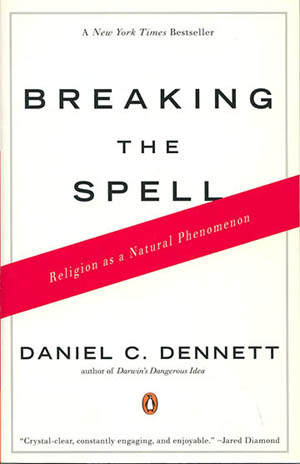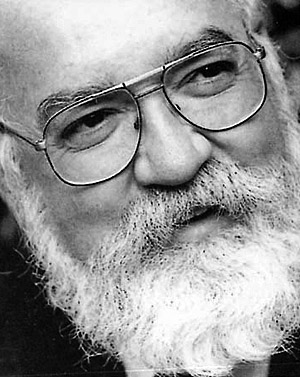February 9, 2010
Book Review: Breaking the Spell

Deeply disappointing!
I watched several Dennett presentations on YouTube and was eager to find out more about his views. "Breaking the Spell" turned out to be one of the worst books I have ever read."If I had more time, I would have written a shorter letter" said Marcus T. Cicero. Dennett must have been in a rush to meet a deadline. One reviewer called him "circumlocutious." At half the pages the book would have been twice as readable. But style, or the lack of it, are not the worst offenders.
Breaking the Spell is supposed to be about the scientific study of religion. The first part, "Opening Pandora's Box" is unnecessarily defensive. Dennett worries about the damage that revealing the truth about religion might cause to its believers. This fallacy is similar to banning guns because they kill people. No, it's not guns that kill, it's people using them that do. Same with religion, it's the clergy that does the harm using religion as their tool.
Later in Part I Dennett latches on to "Cui bono?" (Latin, to whose advantage?) to "prove" that religion is a natural phenomenon that provides benefits for its users. For anyone who believes in Darwinian selection, this should be self evident. Later he admits that the only thing he found out was that he found very little: "More research is required" he states in Part III. It would have been wise to wait for that research before writing this book.

An atheist preacher
It appears that the herding instinct is universal, if afflicts even "Brights" and atheists. Be that as it may, I wonder who gave Dennett the right to speak in the name of people he has not even met and who didn't even elect him. Is he the self appointed High Priest of Brights? I quote: "We brights are quite aware of all the good that religions accomplish, but we prefer to channel our charity and good deeds though secular organizations..." I certainly don't believe that religions produce any net positive for humanity, some people benefit but many suffer from it. Also, not everyone believes in altruism, Ayn Rand denounced it as evil. If it had been just a general statement, I would have let it pass but Dennett insists on preaching to the Brights, how they should do their charity, I quote: "This is to keep our hands clean, but that is not enough--any more than it is enough for moderate Christians to avoid giving funds to anti-Semitic organizations within Christianity, or for moderate Jews to restrict their charity to organizations that are working to secure peaceful coexistence for Palestinians and Israelis. That is a start, but there is more work to be done... " Not only is he "Breaking the Spell" he is preaching which is completely out of line, specially for an atheist.Religion is a form of government
I marked several more passages that raised my hackles in the chapter on "Religion and Morality" but this review is also getting to be too long so let me focus on Dennett's biggest miss, he never saw the forest for the trees. Dennett uses the reductionist methods of scientific inquiry to investigate religion and he discovers its various elements but he misses the evolving uses to which religion is put. While gods and religion evolved quite naturally, religion was highjacked by a cadre of self appointed clerics and turned into a system of autocratic government. Consider the Ten Commandments. Moses is leading an unruly bunch of Jews from Egypt to the promised land. They are getting out of hand, they are making idols, how to get them back in line? Moses didn't have a police force or a riot squad so he had to be creative. He created one of the world's most enduring charades. He went up a mountain and came back with a new rule book and a fantastic story, god, in a burning bush, revealed it all to him. It worked! It would with a superstitious bunch of ignorant people. The modern result is a theocratic Israel as well as Islamic theocracies in several countries. Christianity was the first western religion to propose the separation of church and state. Jesus said: "Render unto Caesar the things which are Caesar's, and unto God the things that are God's." Unfortunately, his followers, the popes in the Dark and Middle Ages, preferred theocracy and the Vatican is the last vestige of this form of Christian government.Until we recognize religion for what it is, a competing system of government, we will never be at peace. Religion should not be given preferential tax treatment. It should have no more prerogatives than a bridge or golf country club if the separation of these two forms of government, secular and spiritual, is to be effective. Dennett entirely misses this issue. He gets bogged down in the reductionist minutiae and misses the emergent reality of religion as a system of government hijacked by preachers for their own ends.
Denny Schlesinger
Breaking the Spell: Religion as a Natural Phenomenon by Daniel C. Dennett
Copyright © Software Times, 2000, 2001, 2003. All rights reserved
Last updated March 8, 2009.
Last updated March 8, 2009.